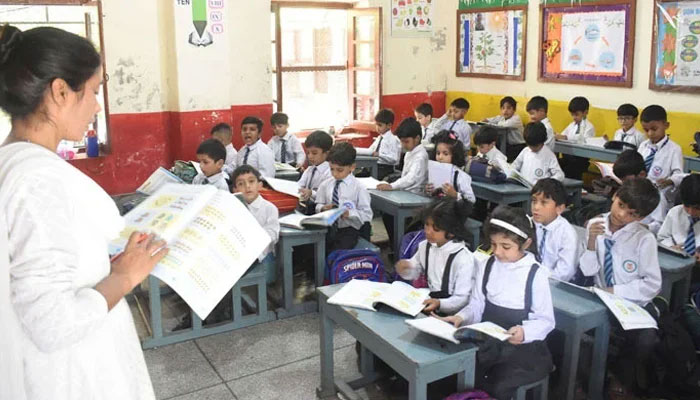Uncooperative administrators hinder educational institutes’ geotagging in Sindh
The process of registering and geotagging educational institutes, including madrasas, in Sindh has been started after the recent amendments to the relevant law for their reforms. However, the Sindh police are facing difficulties due to uncooperative administrators of the institutes.
Sources said the survey, registration and geotagging was earlier conducted by the Special Branch, adding that a review survey of madrasas has been started. They earlier conducted a province-wide survey of illegal immigrants, and also completed the registration of educational institutes to some extent.
The survey did not find any educational institute owned by any illegal immigrant, but due to the present situation, they again ordered a survey of educational institutes, buildings and others places to check if any illegal immigrants owned such places, and also check their documents.
After the enactment of the reforms law, Sindh police chief Ghulam Nabi Memon ordered conducting surveys. Action will be taken against illegal immigrants, but those residing legally or possessing complete documents will not be bothered.
Sources said that many students were earlier involved in terrorism cases, such as the attacks at Safoora Goth, the Karachi Police Office, the University of Karachi and the airport. The authorities decided to register educational institutes, including students, especially foreigners.
The survey was conducted in Karachi and on its outskirts, including the Al-Asif, Rehri Goth, Bin Qasim, Quaidabad, Malir and Gulshan-e-Hadeed areas. The geotagging process ran into difficulties as the institutes’ administrators were found uncooperative. They refused to provide any information about students and staff, and the institutes’ finances.
After the National Action Plan was devised, the registration process was started in Sindh in 2015-16, and since then surveys and registration are conducted by the Special Branch and other agencies at intervals.
A report submitted to the government earlier stated that all madrasas, whether registered or not, had been geotagged. Special Branch officials and other members of the relevant committee conducted the survey physically, especially in the slum areas.
Officials said that this is a continuous process that needs to be monitored and supervised because things keep changing, including the establishment of new institutes.
Initially, some institutes in the province were registered and geotagged, and for those found only on paper and without physical presence, the department concerned was contacted for their cancellation.
According to the data available, there are over 3,000 educational institutes, including madrasas, in Karachi, and all the coordinates for them have been received and their geotagging is under way.
Officials said they faced some resistance during the process but were able to overcome it. They said they are classifying the elements into three categories: anti-state, normal, and facilitators and sympathisers.
Those who were on the Fourth Schedule, anti-social elements, persons with a terrorism record, those delivering hate speeches, and people nominated in FIRs are on the officials’ watch list.
-
 Epstein Case: Ghislaine Maxwell Invokes Fifth, Refuses To Testify Before US Congress
Epstein Case: Ghislaine Maxwell Invokes Fifth, Refuses To Testify Before US Congress -
 Ferrari Luce: First Electric Sports Car Unveiled With Enzo V12 Revival
Ferrari Luce: First Electric Sports Car Unveiled With Enzo V12 Revival -
 Chappell Roan Parts Ways With Wasserman Music Over CEO's Ties With Epstein
Chappell Roan Parts Ways With Wasserman Music Over CEO's Ties With Epstein -
 Andrew Mountbatten Windsor Publically Shamed After Brother And Nephew Change Decades Old Royal Rule
Andrew Mountbatten Windsor Publically Shamed After Brother And Nephew Change Decades Old Royal Rule -
 Jon Stewart On Bad Bunny's Super Bowl Performance: 'Killed It''
Jon Stewart On Bad Bunny's Super Bowl Performance: 'Killed It'' -
 Savannah Guthrie Receives Massive Support From Reese Witherspoon, Jennifer Garner After Desperate Plea
Savannah Guthrie Receives Massive Support From Reese Witherspoon, Jennifer Garner After Desperate Plea -
 Celebrities Take Sides As Brooklyn Beckham’s Feud With David, Victoria Heats Up
Celebrities Take Sides As Brooklyn Beckham’s Feud With David, Victoria Heats Up -
 Prince Harry Reacts As Beatrice, Eugenie's Names Surface In Epstein Emails
Prince Harry Reacts As Beatrice, Eugenie's Names Surface In Epstein Emails -
 Cyprus Joins European AI Race: What It Means For Greek LLMs And Regional Innovation
Cyprus Joins European AI Race: What It Means For Greek LLMs And Regional Innovation -
 Amazon Soon To Launch 'AI Content' Marketplace, Says Report
Amazon Soon To Launch 'AI Content' Marketplace, Says Report -
 Is AI Reliable For Health Advice? New Study Raises Red Flags
Is AI Reliable For Health Advice? New Study Raises Red Flags -
 WhatsApp Web Starts Rolling Out Voice And Video Calling For Beta Users
WhatsApp Web Starts Rolling Out Voice And Video Calling For Beta Users -
 Catherine O’Hara’s Cause Of Death Finally Revealed
Catherine O’Hara’s Cause Of Death Finally Revealed -
 Swimmers Gather At Argentina’s Mar Chiquita For World Record Attempt
Swimmers Gather At Argentina’s Mar Chiquita For World Record Attempt -
 Brooklyn Beckham, Nicola New Move Could Leave David, Victoria Reeling
Brooklyn Beckham, Nicola New Move Could Leave David, Victoria Reeling -
 Anthropic Criticises ChatGPT Ads As OpenAI Begins Testing Advertising In AI Chats
Anthropic Criticises ChatGPT Ads As OpenAI Begins Testing Advertising In AI Chats




